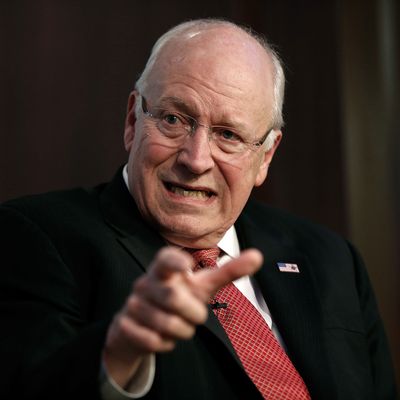
Critics of the Iran nuclear deal have hinged their opposition on the premise that the alternative to the unpleasant concessions to Iran’s unpleasant regime is the mythical “better deal.” Like the mythical Obamacare alternative, the “better deal” has none of the bad stuff contained in the actual Iran deal required to get Iran’s agreement, but it also manages to achieve all the limits and inspections contained in the agreement. The “better deal” is a more convenient basis of comparison for them than the real-world alternative approach to the Iranian nuclear program carried out by the last American presidential administration, which conservatives prefer never to mention. Inconveniently for them, the architect of that administration’s Iran policy, Dick Cheney, remains — at least in the strict, medical sense of the term — alive. His latest growlings on The Wall Street Journal editorial page provide a disturbingly clear picture of what the neoconservative approach to Iran looks like in practice.
Cheney’s op-ed itself relies mostly on the familiar abstractions conservatives use to understand foreign-policy problems. (Cheney writes, “The Obama nuclear agreement with Iran is tragically reminiscent of British Prime Minister Neville Chamberlain’s Munich agreement in 1938,” a predictable analysis given that conservatives have drawn upon the Munich comparison for every negotiation with any enemy since World War II.)
The overarching theme of Cheney’s op-ed is that world peace has been maintained because presidents of both parties, from Harry Truman through the guy who was president before Barack Obama, believed in American goodness and strength. Now it has all been ruined by Barack Obama, who believes in neither. It is when Cheney goes from the general to the specific that his case gets truly weird. According to Cheney, Obama breaks the long-standing bipartisan tradition of denying Iran access to nuclear weapons:
[Obama] says that he is committed to preventing nuclear proliferation. For more than 45 years, presidents of both parties have recognized that the Nuclear Non-Proliferation Treaty is vital in this effort. Signed by 190 countries, including Iran, the NPT has been arguably the single most effective multilateral arms-control agreement in history. President Obama stands ready to gut it. Among the many dangerous deficiencies in his nuclear deal with Iran is the irreversible damage it will do to the international nonproliferation regime contained in the NPT.
Allowing the Iranians to continue to enrich uranium and agreeing to the removal of all restraints on their nuclear program in a few short years virtually guarantees that they will become a nuclear-weapons state, thus undermining the fundamental agreement at the heart of the NPT. President Obama is unraveling this international structure as part of an agreement that provides a pathway for the world’s worst state-sponsor of terror to acquire nuclear weapons.
What makes this so bizarre is that our putative commitment to preventing an Iranian nuclear program disintegrated under Cheney’s watch. It was not under the Obama presidency that Iran arrived on the doorstep of the nuclear club. It was during Cheney’s (vice-) presidency. It was, moreover, Cheney’s contributions to the Middle East landscape that enabled Iran’s general rise. Destroying Iran’s chief rival in the region, Saddam Hussein, without any plan to occupy or to replace that government, allowed Iran to fill the vacuum we created.
Bush and Cheney may have rhetorically opposed the Iranian nuclear program. In reality, they allowed it to blossom. As Marc Champion explained several months ago, “at the start of Bush’s presidency, Iran had no operational centrifuge cascades and no stocks of enriched fuel, so it had no means of making a nuclear weapon.” Then things got bad:
By the time Bush left office in January 2009, Iran had just under 4,000 working centrifuges and an additional 1,600 installed. These had, to that point, produced 171 kilos of low-enriched uranium. Oh, and Iran had covertly built a new enrichment facility under a mountain at Qom.
Measured by results, rather than sound bites, Cheney was the greatest thing that happened to the radical regime in Iran since it took power. Michael Rubin, a former Bush administration Middle East policy adviser, has attempted to defend the administration’s disastrous Iran policy by blaming the failure on our feckless European partners, who continued to trade with Iran, undermining our sanctions. Rubin insists, “the problem was not too little diplomacy, but rather too much trade.” But why were sanctions so weak under Bush, and so much stronger under Obama? Because the Obama administration used the promise of negotiations to build strong support for sanctions. Without those negotiations, the sanctions regime would be just as weak as it was under the Bush administration. The notion that simply refusing to make any concessions whatsoever could prevent Iran from advancing its nuclear program is not a novel idea. Cheney’s administration tried it. It didn’t work.
This is why actual nonproliferation experts support the Iran deal strongly. Sam Nunn and Richard Lugar — respectively, a moderate Democrat and Republican, and deeply versed in nonproliferation — have penned an op-ed endorsing the Iran deal. Presumably Cheney suspects they, too, have rejected decades of America-lovin’ foreign policy.






























